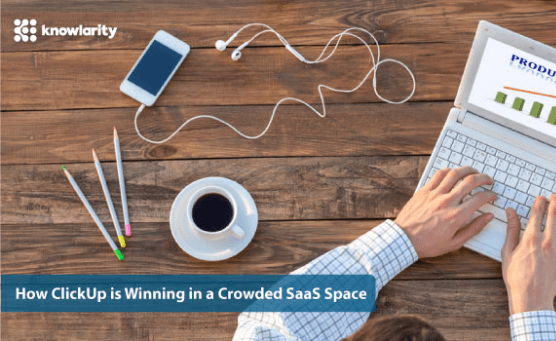Case Study: How ClickUp is Successfully Growing a SaaS product in a Crowded Space

Saas has never been more competitive, and the world of productivity software is no exception. The gorillas continue to dominate, and hundreds of newcomers bring new ideas to the market every day. Yet, ClickUp , a silicon valley-based startup, launched a project management application less than 6 months ago that’s being used by companies like Apple, Nike, Uber, Google, AirBnB and 10,000 other teams.
The project management gorillas Asana, ToDoist, Trello, Basecamp, Jira, Pivotal Tracker, and many more have ruled the industry for years, making it tricky for, anyone who tries to build something new in the space. Being a productivity geek as well as a SaaS enthusiast, I have used the above tools, and naturally, I was curious about how ClickUp was managing to make strides in this crowded space.
Think of it like someone trying to build a new CRM in 2017. What could they possibly do, that stands out and makes people switch? And yet, after many years, I recently came across a CRM, which blew me away, because it nailed an aspect that matters a lot.
What is that aspect? User Experience.
What Matters Most – Now.
Over the past couple of years, new products are succeeding, not because of new features, but because of user experience. That’s exactly how ClickUp managed to delight me and thousand of other users.
Today, the key to capturing a user’s heart, is not through a ton of features, but beautiful design, and I suspected that ClickUp was growing so fast, because it was fixing problems that other tools had overlooked.
When I began to test ClickUp, I realized that UX did play a major role in it’s success, but I wanted to find out more. That’s why I had a discussion with Zeb Evans, Founder and CEO of ClickUp, to learn more about what they are doing right.
Zeb Evans, Founder and CEO of ClickUp talks about their growth strategy:
Peter:
ClickUp has done extraordinarily well in a short period of time. What inspired you to build this company?
Zeb:
I started another company a few years ago and naturally came to use project management software. Even though it increased transparency, accountability, and overall productivity – I absolutely hated using it. We tried every app on the market and each of them had major flaws.
I’m a huge design and user experience person, it became insanely frustrating for me using JIRA and Asana. I felt like no one was paying attention to details, to the things that actually mattered to make people more productive. Most importantly, I felt like Asana was far too little whereas JIRA was way too much in terms of complexity and features set. So when I sold my previous company, I knew we had to solve this problem before we could work on anything else.
At first, we were simply going to build a platform for our internal team, but we quickly realized the demand is massive and we could indeed help make the world more productive through our products.
Peter:
How did you validate your product market fit?
Zeb:
The short answer is, we haven’t.
We only started 4 months ago so while we’ve had extreme growth in those four months, we still are refining our exact market fit.
I don’t want to limit the product to a certain use case or industry, but at the end of the day, we can’t build for everyone. So I tell the team – let’s build for 80% of people. And let’s make the product incredible for those 80% of people.
We have a long way to go until I’m proud of this product, but the fun part is the journey! Our team is highly passionate about the product and vision we’re creating.
Peter:
What growth strategies have you used for acquiring retail customers?
Zeb:
Almost all of our current growth is organic. We do run isolated targeted ads but on a relatively small scale.
Any current retail customers are all referrals from other people. Our users love us and we want to return the favor by continuing to make the product incredible.
Peter:
You have an impressive list of enterprise customers. What’s your strategy for acquiring enterprise customers?
Zeb:
People find us right now, plain and simple. Of course we plan on gearing more towards enterprises in the future but for now, we are focused simply on the 80% of teams that need something with an awesome user experience.
If that includes teams in large enterprise companies, then of course we welcome them onboard with arms wide open.
Peter:
What role do integrations have in your growth strategy?
Zeb:
Integrations are obviously instrumental in growth of any SaaS product. We have a longroadmap ahead of us and while we are currently focused on features, we will absolutely return to focus on integrations and a top-secret feature we think will be game changer in the near future.
Peter:
What kind of resistance do you have from the market which is crowded with numerous project management and task list tools? How do you overcome that resistance?
Zeb:
Project management software is an incredibly crowded marketplace. We choose to focus on the details and nailing the design and user experience.
In the future, we will focus more on our plan for proprietary features. Right now we are just implementing the product plan, if/when we need to, we’ll shift to the growth plan.
We have a rockstar development team that allows us to release at least one new feature every week. Our users look forward to our weekly releases that are in a large part, influenced by their voices.
Peter:
How do you see the future of project management tools evolving?
Zeb:
Personally, I think machine learning will provide extreme benefit to those using project management software.
At the end of the day, project management is all about being more productive. At ClickUp, machine learning is part of our core focus. We’re constantly developing and refining models that we think will save people at least 15% time in routine actions on the platform each day.
Nail What Matters Most
The whole point of a productivity tool, should be to make people productive. To fulfil that goal, a tool has to make things easier and eliminate complexity. That is why ClickUp will be launching machine learning-driven features in future, but to gain a foothold in this crowded space, it adopted a strategy around design and UX to get people to switch now!
Should more SaaS companies pay more attention to UX rather than features? Share your thoughts in the comments section.
To learn further, please visit our Knowlarity Cloud Telephony Website.
Written By: Admin
